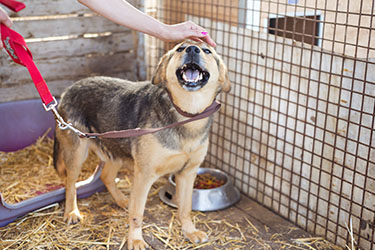Veterinarians: Shelter Pet Adoption Tips

Do you have a client who is considering adopting a shelter pet? What tips should you give them when they ask your advice?
Should You Adopt a Shelter Pet?
Before adopting a shelter pet, clients should contemplate the following:
#1. Is the decision unanimous?
Adopting an animal is a commitment. All family members need to agree that a pet is wanted and that all will pitch in to provide for its care. Unless everyone agrees, it might not be the right time to bring an animal into the family.
#2. Reflect on reasons for getting the pet
Before looking at any animals, spend some time to find the answers to the following questions:
- Why do we think that we want a pet?
- Does our lifestyle support having a pet?
- What are the qualities we should look for to find the ideal pet for our family?
- How will we provide for the animal if it gets sick or injured?
#3. Do your homework about breeds
What do you know about the type of pet you are looking for?
- Try to learn everything you can about an animal before making a final decision on the type of animal to get
- As you research, always stay open to the possibility that the type of pet you want may not be the type of pet you need
- Information on breed characteristics will provide a good understanding of what the animal will be like as it settles into your home, and as it gets older
- Gather advice from friends and family about the pets they have owned.
#4. Research shelters and rescues
Once you have determined the type of pet you are looking for, continue your investigation by thoroughly checking out information on shelters and rescues.
There are many websites that offer easy access to the type of information that should be gathered. For example, www.PetFinder.com provides quick access to information such as:
- Shelters within a mileage radius of a specific zip code
- Shelter and rescue organization contact information
- Highlights and pictures of specific animals available within these shelters
- Educational information to answer questions on topics such as:
- Animal and breed characteristics
- Adopting an animal
- Pet care.
- Try to determine if the shelter or rescue will be able to handle your needs both before and after the adoption.
- What are their adoption policies?
- How do they work with a family to ensure the adopted animal is a good fit?
- What personnel resources do they have available to adopters? For example, do they have on-site trainers, behaviorists or veterinarians?
- Do they have a policy on bringing an animal back?
- If you have a question, how do you contact the facility?
- What is provided with the adoption of an animal? Do they provided completed:
- Health checks
- Vaccinations
- Rabies
- Dental checks
- Dental care.
#5. Plan to visit the facility
Whether you have identified a pet from their website or just want to go to the facility to look, make the time to talk with shelter personnel. These are the people that have been taking care of the animals, and their input and recommendations will help to ensure a good match between animal and family. For example, since they are familiar with the animal, they would know if the animal:
- Has a high energy level and will need a home with plenty of room to run
- May not be suitable for a family with young children
- Is an escape artist and will need a home with a fenced-in yard
- Has past or present behavioral issues that may indicate the animal needs to be adopted by someone who has more experience with training pets or who has no small children
- Has a health issue or is older, factors that would keep it from being able to comfortably keep up with a highly active family
- Has dominant traits that would make it more suitable to a house with no other animals.
#6. Applying for a pet
Most rescues and animal shelters require the completion of an application before being approved to adopt an animal. If you are a past or current animal owner, they may also request you provide contact information for:
- Someone who can make a reference regarding your ability to provide animal care, and
- The veterinarian you use for your animals
A home care check may also be requested before the final approval to adopt is granted.
The intent of the application, contact information and home care checks are to confirm the home is set up to offer a happy, safe, and comfortable place for the animal to live.
Remind your clients to be patient and wait for the right animal for them!
Your Covetrus North America representative can provide additional information on protecting a pet against Lyme disease. Contact us at: 855.724.3461.
Careers
Are you looking for a place to let your talents shine? At Covetrus, we help our practitioner customers better serve their patients and take pride in providing the best customer experience possible. Search our open positions to see our available opportunities.
Newsletter
Stay current with what’s going on with Covetrus, subscribe to receive our newsletter and email communications. Subscribers will receive the latest information in practice management, sales and marketing, animal health, and more.




Leave a comment